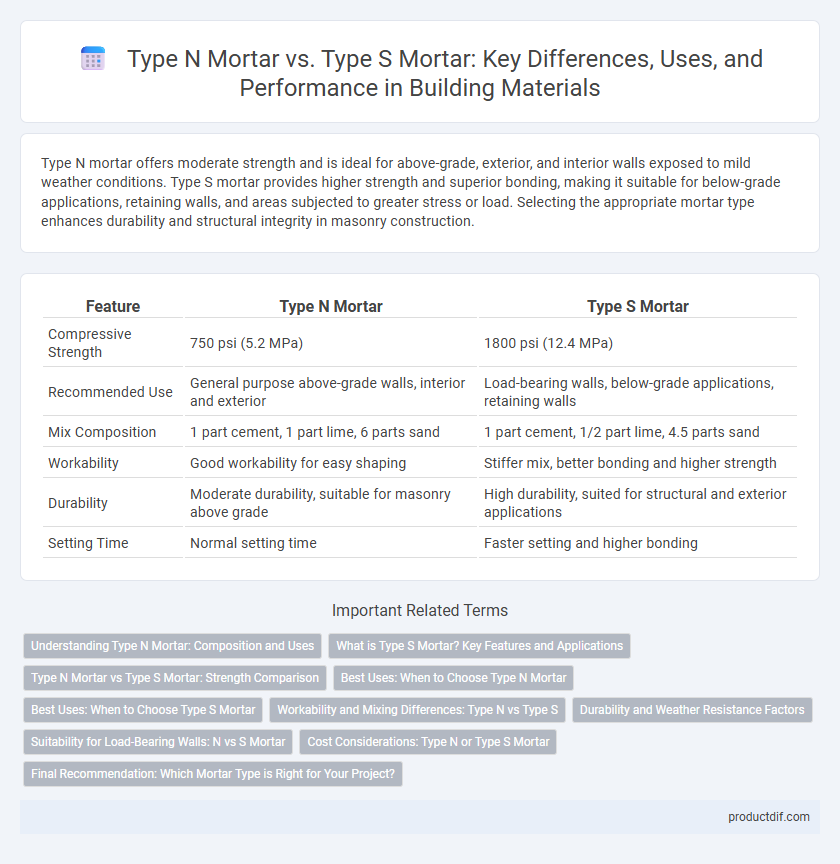Type N mortar offers moderate strength and is ideal for above-grade, exterior, and interior walls exposed to mild weather conditions. Type S mortar provides higher strength and superior bonding, making it suitable for below-grade applications, retaining walls, and areas subjected to greater stress or load. Selecting the appropriate mortar type enhances durability and structural integrity in masonry construction.
Table of Comparison
| Feature | Type N Mortar | Type S Mortar |
|---|---|---|
| Compressive Strength | 750 psi (5.2 MPa) | 1800 psi (12.4 MPa) |
| Recommended Use | General purpose above-grade walls, interior and exterior | Load-bearing walls, below-grade applications, retaining walls |
| Mix Composition | 1 part cement, 1 part lime, 6 parts sand | 1 part cement, 1/2 part lime, 4.5 parts sand |
| Workability | Good workability for easy shaping | Stiffer mix, better bonding and higher strength |
| Durability | Moderate durability, suitable for masonry above grade | High durability, suited for structural and exterior applications |
| Setting Time | Normal setting time | Faster setting and higher bonding |
Understanding Type N Mortar: Composition and Uses
Type N mortar, composed of one part Portland cement, one part lime, and six parts sand, offers medium strength suitable for above-grade, exterior, and interior load-bearing installations. Its balanced composition provides excellent workability and flexibility, making it ideal for general-purpose masonry work such as brick and stone veneers. Type N mortar resists moderate weather exposure while maintaining strong bonding properties for residential and commercial construction projects.
What is Type S Mortar? Key Features and Applications
Type S mortar is a high-strength, medium-lime mortar designed for structural applications requiring enhanced durability and compressive strength up to 1,800 psi. It features superior bonding properties, making it ideal for exterior walls, retaining walls, and load-bearing masonry units exposed to severe weather conditions. Commonly used in brick, block, and stone masonry, Type S mortar provides excellent resistance to wind, seismic activity, and moisture infiltration.
Type N Mortar vs Type S Mortar: Strength Comparison
Type S mortar offers higher compressive strength, typically around 1,800 psi, making it ideal for structural applications and load-bearing walls, whereas Type N mortar has a lower compressive strength near 750 psi, suitable for general purpose and non-load bearing masonry. The enhanced strength of Type S mortar comes from its higher cement content and greater hydraulic cement proportions, providing better durability against weathering and heavy loads. Builders select Type N mortar for softer stone and brick work where flexibility is needed, while Type S mortar is preferred for exterior walls and retaining walls requiring greater mechanical strength.
Best Uses: When to Choose Type N Mortar
Type N mortar is best suited for above-grade, exterior, and interior walls where medium compressive strength and flexibility are needed, such as in brick veneer, chimneys, and general-purpose masonry. It offers excellent workability and weather resistance for soft masonry units like clay bricks and stone. Choose Type N mortar for projects requiring moderate bonding strength and durability without the need for heavy structural support.
Best Uses: When to Choose Type S Mortar
Type S mortar is ideal for structural applications requiring high strength and durability, such as load-bearing walls, retaining walls, and exterior projects exposed to severe weather conditions. Its higher compressive strength, typically around 1,800 psi, makes it suitable for masonry work subjected to greater tensile and shear forces. Choosing Type S mortar ensures enhanced bonding and longevity in demanding construction environments compared to the softer Type N mortar.
Workability and Mixing Differences: Type N vs Type S
Type N mortar offers better workability and is easier to mix, making it suitable for above-grade, general-purpose applications requiring moderate strength. Type S mortar has a stiffer consistency and demands more effort during mixing, designed for structural applications that need higher compressive strength and greater durability. The choice between Type N and Type S influences the mixing ratio, water content, and workability, directly impacting the mortar's performance in masonry projects.
Durability and Weather Resistance Factors
Type S mortar offers superior durability and weather resistance compared to Type N mortar, making it ideal for exterior applications exposed to harsh weather conditions. Its high compressive strength of approximately 1,800 psi ensures better adhesion and longevity in retaining walls, foundations, and load-bearing structures. In contrast, Type N mortar, with a compressive strength around 750 psi, is better suited for above-grade walls in moderate climates where flexibility and aesthetic finish are prioritized over extreme weather resistance.
Suitability for Load-Bearing Walls: N vs S Mortar
Type S mortar offers higher compressive strength, making it ideal for load-bearing walls where structural integrity is critical. Type N mortar, while durable, is better suited for non-load-bearing walls or exterior applications with moderate stress. Choosing Type S mortar ensures enhanced bonding and stability in masonry systems that require significant load support.
Cost Considerations: Type N or Type S Mortar
Type N mortar typically costs less than Type S due to its medium compressive strength and versatile applications in above-grade walls and general masonry work. Type S mortar commands a higher price because of its high compressive strength, making it suitable for structural elements such as foundations and retaining walls that require enhanced durability. Choosing between Type N and Type S mortar depends on balancing budget constraints with the specific performance requirements of the construction project.
Final Recommendation: Which Mortar Type is Right for Your Project?
Type N mortar offers medium strength and is ideal for general-purpose projects such as exterior and above-grade walls, where moderate durability is required. Type S mortar provides higher strength and better resistance to shear and flexural stresses, making it suitable for load-bearing walls, below-grade applications, and areas exposed to harsh weather conditions. Assess project requirements based on load, exposure, and structural needs to determine whether Type N or Type S mortar will deliver optimal performance and longevity.
Type N Mortar vs Type S Mortar Infographic

 productdif.com
productdif.com